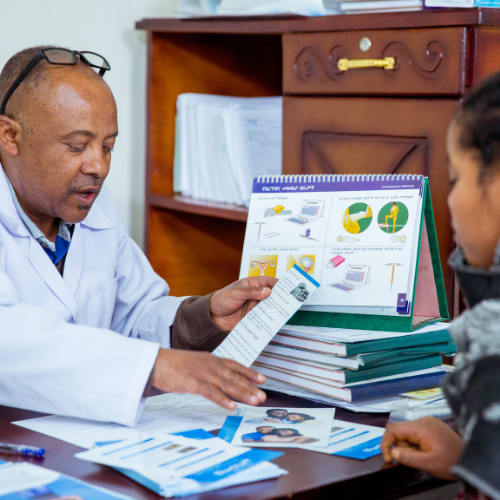Leveraging Social Accountability to Include Family Planning in Country-Level Universal Health Coverage: Four Lessons Learned from PAI’s UHC Engage Project

Over the past two years, under our UHC Engage project, PAI and civil society partners in sub-Saharan Africa and Asia have focused on the opportunities to advance sexual and reproductive health and rights, including family planning, as part of universal health coverage reform. The challenge is that universal health care is multifaceted and country-specific in nature. Decoding the policy and financing reform environment for each country is key to illuminating the openings that exist for civil society to engage policymakers to increase access to sexual and reproductive health services for everyone, especially women and girls.
The details of emerging policies at the country level are not widely available at the global and regional levels and the country briefs in our Decoding Country-Level UHC Financing Policy series fill this critical knowledge gap.
Universal health coverage is not a new concept in Ghana. Between the late 1970s and early 2000s, the Ministry of Health introduced significant policy reforms to increase access to quality health care while ensuring a financial safety net from out-of-pocket spending. The 2015 sustainable development goals renewed energy to make new progress toward universal health coverage.
The goal of universal health coverage (UHC) is inspiring landmark political and systemic change all over the world to guarantee access to the quality services people need — spanning preventive through palliative care — and financial protection to ensure they are not pushed into poverty by realizing their right to health care. However, the details of emerging policies at the country level are not widely available at the global and regional levels. Through the UHC Engage project, PAI and partners collaborated to develop a series of publications demystifying country-specific UHC financing policies to illustrate family planning (FP) advocacy opportunities and inform the international dialogue. As each country is in a different stage of UHC financing reform, these briefs deconstruct UHC policy processes in real time, illuminate multifaceted examples for advancing FP in UHC-oriented policies and offer insights across multiple contexts for sexual and reproductive health and rights (SRHR) advocates to strengthen global action.
In Ghana, Marie Stopes International Ghana (MSIG) is one of the organizations advocating for strong UHC policies that prioritize SRHR. Along with key partners, MSIG is working to fill a critical FP access gap and bolster the evidence base for policymakers who will decide whether and how to fully cover FP in UHC-oriented reforms. MSIG is advocating for improved availability, accessibility and expanded use of modern FP services, especially for those who need it most but are hindered by out-of-pocket costs: individuals of low socioeconomic status and adolescents. Research has shown that cost is a barrier for FP services, and MSIG’s advocacy to remove this financial limitation on Ghanaian’s SRHR can improve access to and use of FP.
Ghana’s government announced its first Family Planning 2020 commitments in 2012 and has since led a multisectoral effort to expand access and availability of quality FP services at all levels of the health system. As of 2019, the modern contraceptive prevalence rate (mCPR) among all women is 22.2% and the current unmet need for FP is 32.9%.1 Government leaders have also prioritized improving FP access for adolescents, expanding contraceptive method mix, mobilizing domestic resources and, for the first time, including FP in the National Health Insurance Scheme (NHIS) benefits package.2 However, more progress is needed to reach the government’s FP commitments. FP commodities are free in public sector facilities, but in order to receive their chosen contraceptive method, women and girls still face the barrier of paying out of pocket for the service provision. The National Health Insurance Fund finances free maternal health services, and although the revised 2012 National Health Insurance Act establishes a legal provision for the Fund to also finance FP, policymakers have yet to follow through with the required policy changes.
In Ghana, FP is financed by the government, out-of-pocket spending, private sources and international donors. As of 2017, the government directly funded only one quarter of all FP commodities, with a target to cover one-third by 2020.3 This funding comes from a dedicated budget line for essential health commodities which includes contraceptives, but the amount is inadequate to meet the need for FP. As such, Ghana’s FP commodity procurement is highly dependent on international donors, including the U.S. Agency for International Development and the U.K. Department for International Development.
After initially excluding FP in its landmark NHIS 16 years ago, Ghana is piloting reimbursements for FP in seven districts to catalyze progress toward UHC. This pilot reflects years of advocacy and presents a long-awaited opportunity for incorporating FP into a newly reopened NHIS benefits package. Including FP in the benefits package would allow FP commodities and services to be funded by the National Health Insurance Fund, in addition to the existing dedicated budget line. This would mitigate out-of-pocket barriers for women accessing FP through the public sector, as well as enable the government to increase its domestic financing for FP and reduce donor reliance.
UHC is not a new concept in Ghana: Between the late 1970s and early 2000s, the Ministry of Health introduced significant policy reforms to increase access to quality health care while ensuring a financial safety net from out-of-pocket spending. These reforms spanned from a primary health care strategy and the Community-Based Health Planning and Services program to the NHIS in 2003. Since then, Ghana’s UHC strategy has evolved to prioritize filling gaps in quality service provision and financial risk protection. The 2015 sustainable development goals brought policymakers renewed energy to unite disparate UHC-focused programs and make new progress toward UHC.
We are fighting back against the onslaught of harmful policies that discard reproductive rights.
Stay informed about the issues impacting sexual and reproductive health and rights.
